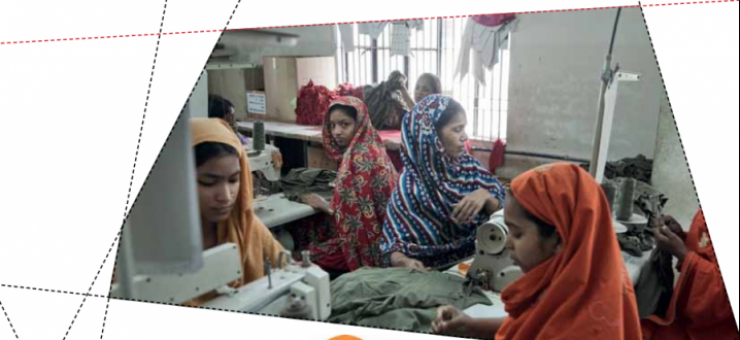New evidence reveals EU Action on Bangladesh labour rights abuses long over-due

In light of new evidence, trade unions and labour organizations are renewing their calls to the European Commission to make good on its promise to launch a trade investigation into Bangladesh as a result of its government’s continued failure to make urgently needed reforms to the law and practice governing trade union rights in the country’s Ready Made Garment industry.
In a new white paper sent to the European Commission, Clean Clothes Campaign, the International Trade Union Confederation, the European Trade Union Confederation, IndustriALL Global Union and UNI Global Union provide clear evidence that, despite signing a “Sustainability Compact” with the European Union four years ago, the Government of Bangladesh remains in violation of this Compact, failing to make vital reforms required to ensure its garment industry complies with core international labour standards.
The white paper focuses on four key areas which have remained a major focus of concern for the EU, the ILO, unions and labour rights groups, and other stakeholders in the international community following the catastrophic collapse of the Rana Plaza building in Bangladesh, including labour law reform, freedom of association in the Export Processing Zones (EPZs), improving union registration and the curtailing of anti-union discrimination.
The Sustainability Compact for Bangladesh includes a number of specific and time-bound actions in these four issue areas which the Government of Bangladesh committed itself to implementing when it signed the Compact in 2013. However, although Bangladesh continues to fall behind on the required actions, the EU has yet to launch a trade investigation in Bangladesh to confirm the extent to which core labour and human rights standards are being met.
On behalf of Clean Clothes Campaign (CCC) Ben Vanpeperstraete states: “There is insufficient progress towards labour law reform, no clarity as to what action will be taken to improve workers associational rights in the EPZs, a steep deterioration in union registration practices and a long list of severe violence against unions. The Bangladesh government has had over four years, considerable technical and financial support and numerous opportunities to demonstrate their commitment to reform.”
In May 2017, the European Commission extended the deadline for action to August 2017, at which time the Bangladesh Government was expected to provide the EU with “tangible progress” in order to remain eligible for the EU’s preferential trade access. This deadline extension followed a number of previous extensions and has now passed without consequences. This is indicative of the European Commission’s reluctance to use the power it has to adequately hold the Bangladesh government accountable through a trade investigation.
International Trade Union Confederation (ITUC) General Secretary Sharan Burrow states: “The Government of Bangladesh is consistently failing to meet its obligations under international law to protect workers’ rights. The result is continued exploitation and poverty wages for workers in the garment industry. An EU investigation would help break the stranglehold that factory owners in Bangladesh have over the parliament and government, and would provide vital support for workers and their families.”
As Bangladesh’s largest trading partner, the EU retains both the power and responsibility to help ensure labour standards are being met in Bangladesh. CCC’s new white paper on Bangladesh includes a number of case studies which underscore how union activists continue to face significant anti-union discrimination and violence. These cases coupled with the crackdowns on peaceful wage protests earlier this year prove that dialogue has been a completely ineffective approach for ensuring meaningful change in Bangladesh.
Jenny Holdcroft, IndustriALL Assistant General Secretary says: “Despite promises made, it is still extremely difficult for workers in Bangladesh to exercise their fundamental labour rights. The continued failure of the Bangladeshi government to take the necessary action to protect workers’ rights is ample reason for the EU to launch the much-needed trade investigation.”
Christy Hoffman, Deputy General Secretary of UNI Global Union adds: “The Bangladeshi government has dragged its feet to avoid real reform for a very long time. The rights to organize and bargain are still hollow promises for Bangladeshi workers who have not seen any changes on the ground. The EU should use its influence and investigate.”
On behalf of European Trade Union Confederation (ETUC) Confederal Secretary Liina Carr states: “We call the European Commission to be consistent with its “Trade for all” agenda to promote the respect of labour rights around the world. Trade between EU and Bangladesh should be an opportunity to raise labour standards. We need to break up the vicious circle of workers’ exploitation in the garment industry in Bangladesh that ultimately affects European workers too in a race to the bottom.”
ITUC, IndustriALL, UNI, ETUC and CCC are urging the European Commission to stop extending deadlines and to act upon on its warnings towards the Government of Bangladesh by starting a trade investigation into its continued eligibility to preferential access to the EU market in order to pressure Bangladesh to embark upon meaningful labour reform. A trade investigation will provide ample opportunity for the Bangladeshi government to do the right thing, but will also provide the stick that is so clearly needed for change.

